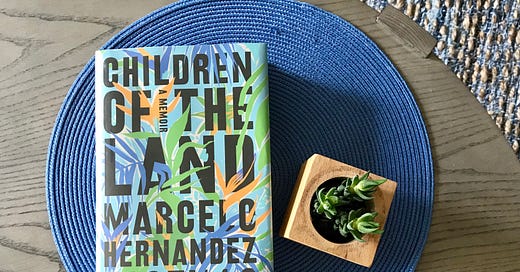Immigrant Strong: October Issue
On loving a country, being called an alien, and a Tibetan pendant

Marcelo Hernandez Castillo’s Children of the Land is a moving memoir about growing up undocumented in the United States and the impact of our country's cruel and draconian immigration policies on one family. The author, a prize-winning poet, writes about what it is like to live in a country that never accepts you or your family, no matter how many years and decades you have lived in it. It belongs on a long list of books I think should be required reading for our politicians — a group that disproportionately consists of rich, old, white men — who often make critical policy decisions without understanding the lifelong trauma and suffering they inflict on generations of immigrant families.
This book exemplifies why I started this newsletter more than a year ago: immigrant stories need to be told by immigrants. Too often, immigrants are portrayed only in terms of laws or economics, instead of the complex and beautiful lives we lead, full of joys and sorrows. Marcelo Hernandez Castillo takes us one such journey, as heartbreaking as it is at times.
Essays
Let’s start with this great piece by Ru Freeman, Many Rights, Few Responsibilities: What Does It Mean to be An American Citizen? for LitHub.
“Love for a country must surely carry with it love for its many parts. To claim love for this country and yet care not a whit for the public education of other people’s children, or the fate of young people too poor to have any other choice but to risk their lives at war, or the abandonment of people whose skin color marks them for a lifetime of injustice, is to exist in a vacuum where you possess but a superficial understanding of those two words: love, country.”
There are many things that rang true to me in this wonderful essay by Namrata Verghese, When Your Country Calls You an Alien, for Catapult.
“This is what they don’t tell you about migration: It is a trauma. It is a rupture, cracking our lives into a before and an after. It would be easy to say that America scabbed over the wound of our past, but that is not the full story. The truth of it is this: We are a haunted people.”
Here is another beautiful essay by Ann Tashi Slater in her Catapult column, Darjeeling Journal; How a Tibetan Turquoise Pendant Keeps Me Close to Home.
“Where will my children’s children be born? And their children? We don’t have to worry about worn-out soil, but is there a reverse effect, an exile caused by constant planting in new ground?”
I also enjoyed While the World Baked Sourdough, I Perfected My Tahdig by Yassmin Manauchehri for Grub Street.
“I have long felt like a person with two identities, and, as I stood plucking endless leaves of parsley for my stew of fried herbs and lamb shanks, the American half of my personality wondered if I should have just made bread after all.”
Here is Fatima Bhutto’s LitHub essay, A World on Fire: Fatima Bhutto on Surviving Crisis.
“Resistance has been demoted to a performance of likes and dislikes, a situating of the self in the centre of the world. But to resist is not simply an act of refusal, of holding back against a drowning tide; it is to act totally with love in a world of sinister complicity.”
Here is The Comforts of Clutter, with photographs by Leonard Suryajaya and words by Laila Lalami for The New York Times.
“I realized a while back that my attachment to these material things was an attempt to hold on to a past from which I feared drifting. A portable history, in the form of family heirlooms or cultural objects, is a balm for the itinerant life of an immigrant.”
I’ll wrap it up with this powerful Guernica piece about the pernicious role of white supremacy in developing beauty standards, the importance of representation, and the author’s relationship with her Black body and hair. Here is You Have to Suffer by Vanessa A. Bee.
“Girls my complexion didn’t model in clothing catalogues or grow up to present the evening news. Nor were we written into fairy tales. To play princesses, we suspended more reality than our white friends. Brooms morphed into horses and rugs into flying carpets. But our skins also became white, our noses narrow, our hair silky.”
Thanks for reading,
Vesna
Virtual Event
Check out this event tonight (Tuesday, Oct. 20) by the New York Public Library with Laila Lalami and Fatima Bhutto.
About this newsletter: Writing about immigrant and refugee life—the struggles, triumphs and quirks—by immigrants and refugees, and children of immigrants and refugees. Photo in the logo: Miguel Bruna/Unsplash.
About me: I grew up in the former Yugoslavia, then moved to Canada, and now live in the United States, where I work as a writer and communications consultant for nonprofits focusing on human rights. I have written about my immigrant experience for The New York Times, Catapult, the Washington Post and the New York Daily News. Find me on twitter, @vesnajaksic, or on my website, www.vesnajaksic.com.




I loved Namrata Verghese's essay as well - achingly honest and heart-wrenching. The same goes for her collection of short stories - The Juvenile Immigrant.